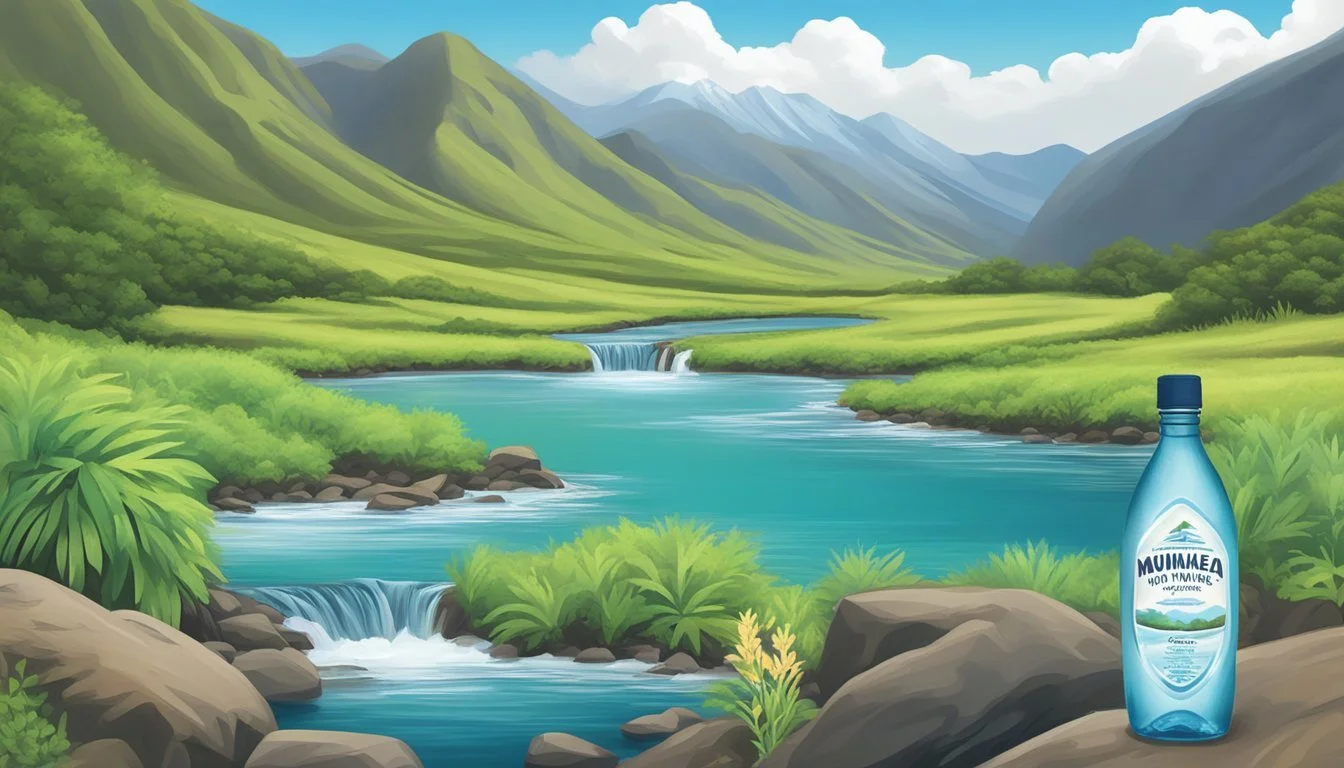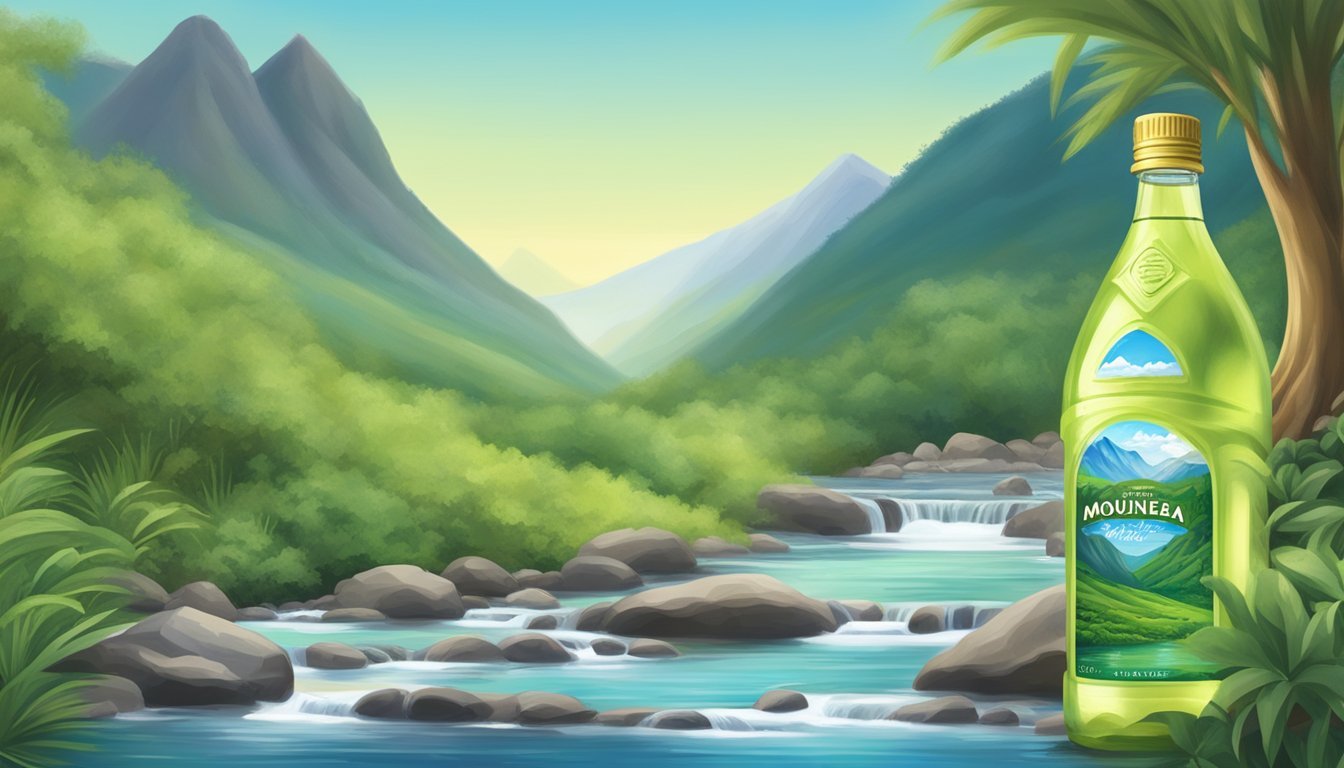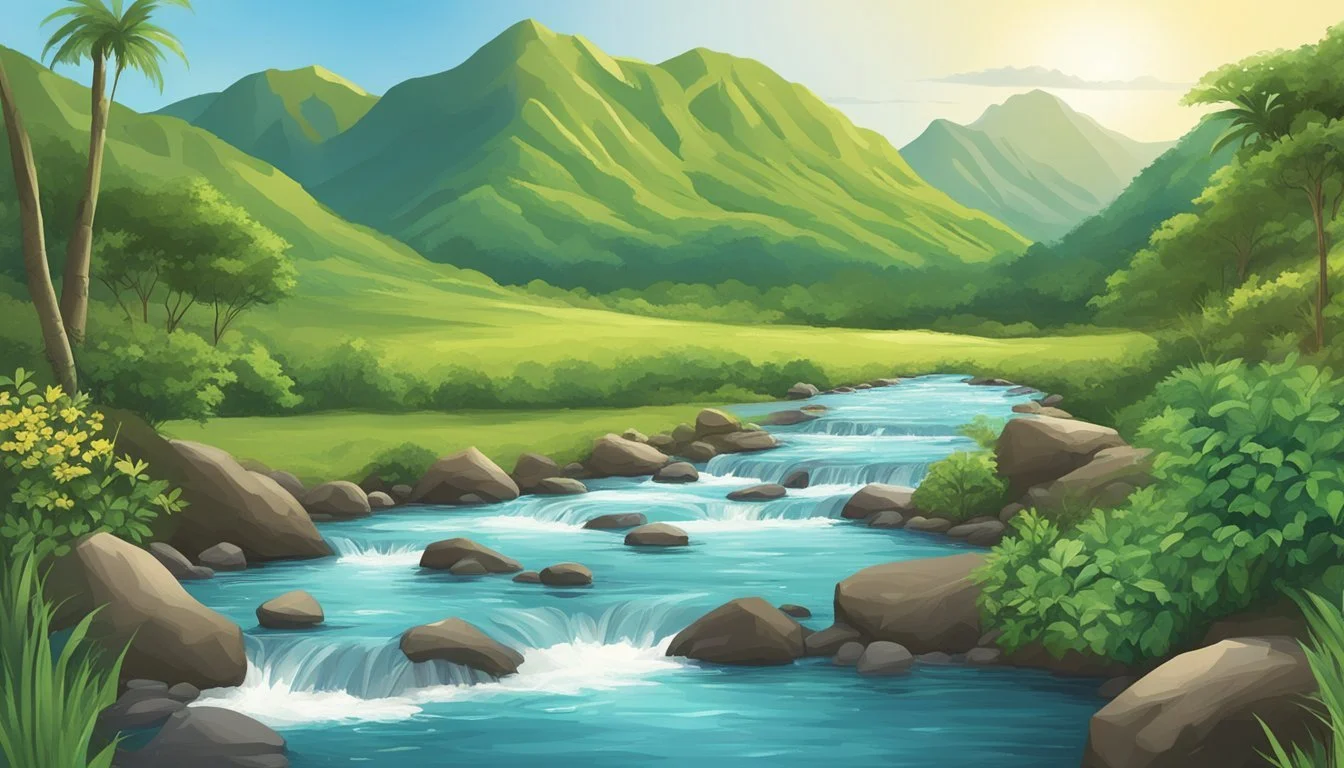Mountain Valley Spring Water vs. Waiakea
A Comprehensive Comparison
When it comes to premium bottled water, Mountain Valley Spring Water and Waiakea are consistently mentioned among the best. Both brands boast unique qualities and health benefits, making it difficult to choose between the two. Mountain Valley Spring Water, sourced from Arkansas's Ouachita Mountains, is celebrated for its pure, crisp taste and remarkable smoothness. This water's distinguished flavor and texture have earned it numerous accolades and a loyal following.
Waiakea, on the other hand, offers a distinct advantage with its naturally alkaline water sourced from the untouched Mauna Loa volcano in Hawaii. This eco-friendly brand promotes sustainability with its 100% recycled bottles. They also emphasize the health benefits of their water's natural minerals and electrolytes, making it a popular choice for those seeking both quality and environmental consciousness in their bottled water.
When comparing these two top-tier brands, it's essential to consider what factors matter most to you. Whether it's the luxurious mouthfeel of Mountain Valley or the sustainable and health-boosting aspects of Waiakea, each offers something unique for the discerning water connoisseur.
Understanding Bottled Water
Bottled water comes in various forms, each with distinct characteristics. It's crucial to understand these differences and the regulatory standards they meet.
The Basics of Bottled Water
Bottled water is packaged drinking water. It can be classified by its source and treatment. Key types include spring water, natural spring water, mineral water, artesian water, purified water, and sparkling water.
Spring water is sourced from underground formations. It's often rich in natural minerals, making it a popular choice among consumers.
Purified water undergoes thorough treatment processes like distillation, deionization, or reverse osmosis, ensuring it meets the high purity standards.
Types of Bottled Water
Spring Water: Sourced from natural springs, often labeled as natural spring water. It's typically collected at the point where the spring water flows naturally to the surface.
Mineral Water: Contains a specific mineral content. The minerals are naturally present and cannot be added during the bottling process.
Artesian Water: Comes from a confined aquifer that flows to the surface through a natural pressure. It’s often marketed for its purity and balanced mineral content.
Purified Water: Has been highly treated to remove impurities. This type includes distilled and deionized water and is known for its cleanliness and safety.
Sparkling Water: Contains carbon dioxide, either naturally or artificially added. It’s enjoyed for its fizzy texture and refreshing taste.
Regulations and Standards
The FDA regulates bottled water, ensuring it meets safety standards for consumption. Bottled water must comply with the Federal Food, Drug, and Cosmetic Act.
Testing is conducted for contaminants like bacteria and chemicals. Bottled water facilities must follow Good Manufacturing Practices (GMPs) to ensure product safety and quality.
Labeling requirements include the source of the water and the type of water. This ensures consumers can make informed choices. While spring water and mineral water must come from specified sources, purified water needs rigorous treatment to meet purity criteria.
Profile: Mountain Valley Spring Water
Mountain Valley Spring Water, sourced from the serene Ouachita Mountains in Arkansas, prides itself on its purity and rich history. Renowned for its balanced mineral content and smooth taste, it has been a staple among bottled waters for over a century.
History and Origin
Mountain Valley Spring Water has been bottled at its source in the Ouachita Mountains since 1871. Its long-standing reputation was built on delivering pure, high-quality spring water to consumers across the United States. It gained popularity in the early 20th century when it was delivered door-to-door in glass bottles, a tradition that emphasized the brand’s commitment to sustainability and quality.
By the mid-1900s, Mountain Valley Spring Water was recognized nationally, even serving U.S. presidents and Hollywood celebrities. Its dedication to maintaining the historic integrity of its bottling practice, specifically using glass bottles, remains a testament to its legacy and commitment to environmental sustainability.
Source and Filtration Process
The water comes from a spring located deep within the protected Ouachita Mountains in Arkansas, an area known for its pristine environment. The natural filtration process through layers of granite and sandstone gives the water its unique mineral composition, which includes calcium, magnesium, and potassium.
This natural filtering not only enhances the water's flavor but also ensures its purity and safety, free from contaminants. The water is then carefully bottled at the source in recyclable glass bottles, preserving its taste and contributing to sustainable practices. The careful handling and minimal processing of Mountain Valley Spring Water ensure that it retains its natural characteristics from source to bottle.
Profile: Waiakea Hawaiian Volcanic Water
Waiakea Hawaiian Volcanic Water is renowned for its unique origin, sustainability efforts, and natural filtration process. This section details its history, distinctive features, and natural filtration through volcanic rock.
History and Distinctive Features
Waiakea was founded in Hilo, Hawaii, and claims to be the first Hawaiian volcanic water. The brand emphasizes its triple bottom line approach, focusing on health, sustainability, and ethical practices.
They source water from snowmelt and rain on Mauna Loa volcano. The water is naturally alkaline with a pH level typically ranging from 7.6 to 8.2. It’s also rich in minerals and electrolytes.
Waiakea aims to be environmentally friendly by using 100% recycled bottles and is certified carbon-neutral. Every purchase also contributes to clean water access and education for those in need.
Natural Filtration through Volcanic Rock
Waiakea water undergoes a unique filtration process as it passes through thousands of feet of porous volcanic rock. This natural filtration enhances the water with minerals and electrolytes, providing a smooth taste and natural alkalinity.
The filtration process is credited with imbuing the water with essential minerals such as calcium, magnesium, and silica. These minerals contribute to Waiakea's distinct taste and potential health benefits.
This natural process ensures the water remains pure without the need for chemical treatments. Originating from one of the purest environments on Earth, it is a prime example of nature’s ability to produce high-quality drinking water.
Comparing Quality and Taste
Mountain Valley Spring Water and Waiakea Water are both recognized for their unique qualities. Their differences in taste, mineral content, and pH levels highlight the importance of choosing the right water.
Taste Profiles
Mountain Valley Spring Water originates from Arkansas and has a light and clean taste with a slight sweetness due to its natural mineral composition. The velvety texture adds to the overall drinking experience, making it a preferred choice for many.
Conversely, Waiakea Water comes from Hawaii and is known for its smooth and crisp taste. The volcanic filtration process lends it an unmistakable freshness, along with subtle, earthy notes that differentiate it from other brands.
Mineral Content Comparison
Mountain Valley contains a diverse range of minerals that contribute to its taste and health benefits. The key minerals in Mountain Valley include:
Calcium: 67 mg/L
Magnesium: 7 mg/L
Potassium: 1 mg/L
Silica: 15 mg/L
These minerals not only affect the taste but also have various health benefits.
Waiakea Water also boasts a rich mineral content, sourced from volcanic rock. Its key minerals include:
Calcium: 32 mg/L
Magnesium: 9 mg/L
Potassium: 7 mg/L
Silica: 30 mg/L
The unique volcanic origin gives Waiakea its distinctive mineral profile, contributing to both the taste and health benefits.
pH Level Differentiation
Mountain Valley Spring Water typically has a neutral to slightly alkaline pH of around 7.8 to 8.2. This makes it appealing to those looking for balanced water that can support acid-neutralizing properties.
Waiakea Water, known for its alkalinity, has a pH level of about 8.8. This higher pH classifies it as alkaline water, which is often sought out for its potential health benefits and its ability to absorb better into the body compared to neutral water.
Both brands offer unique pH benefits, catering to specific preferences and needs, making them standout options in the bottled water market.
Health Benefits and Considerations
Mountain Valley Spring Water and Waiakea both offer unique health benefits due to their distinct mineral compositions and pH levels. However, potential risks associated with contaminants and environmental impact must be considered when choosing between them.
Hydration and Electrolytes
Proper hydration is crucial for maintaining body functions. Both Mountain Valley and Waiakea water assist in hydration. Waiakea’s naturally alkaline pH of 8.8 can help balance acidity in the body, contributing to better hydration.
Mountain Valley, with its balanced pH, effectively supports hydration and may aid in maintaining electrolyte levels. It contains minerals like sodium, potassium, and magnesium, vital for electrolyte balance. Consuming these waters can help replenish lost electrolytes, especially after physical activity.
Minerals and Body Balance
Mountain Valley Spring Water is rich in calcium, magnesium, and potassium, essential for bone health, muscle function, and overall body balance. These trace elements are critical for various physiological functions.
Waiakea water stands out with its high silica content, which can promote healthier skin, nails, and hair. Its mineral profile includes beneficial elements like calcium and magnesium, supporting vital bodily functions. Both waters provide minerals that contribute to maintaining optimal health and supporting metabolic activities.
Potential Risks and Contaminants
While bottled waters are generally safe, potential contaminants like heavy metals must be considered. Mountain Valley Spring Water is sourced and tested to meet FDA standards, minimizing risks of lead, arsenic, or other harmful substances.
Waiakea also undergoes rigorous testing to ensure safety, maintaining low contaminant levels. However, environmental concerns related to extraction, bottling, and transportation impact both brands. Considering these factors ensures a well-informed decision for health and environmental impact.
Environmental Impact and Sustainability
Mountain Valley Spring Water and Waiakea both aim to reduce their environmental footprints through thoughtful packaging choices and sustainable practices. They each use different materials and strategies to ensure their products are eco-friendly.
Bottles and Packaging
Mountain Valley Spring Water uses glass bottles, which can be reusable and recyclable. Glass helps maintain the purity of the water but requires significant energy to produce and transport due to its weight. They also offer BPA-free plastic options for consumers seeking lighter, easier-to-carry choices.
Waiakea, on the other hand, opts for 100% RPET (recycled polyethylene terephthalate) plastic bottles. RPET uses less energy in production compared to virgin plastic and reduces plastic waste. Additionally, Waiakea's packaging is designed to be recycled, promoting a circular economy.
Sustainable Practices
Mountain Valley focuses on ethical sourcing from natural springs and actively monitors water quality. They strive to implement eco-friendly extraction methods to minimize environmental disruption. Their commitment extends to reducing carbon emissions through efficient transportation and encouraging consumers to recycle.
Waiakea promotes a holistic approach to sustainability, including a certified CarbonNeutral® status. They use energy-efficient processes and invest in renewable energy projects. Furthermore, Waiakea advances community efforts by donating clean water to those in need through regional partnerships, underlining their broader commitment to the planet and its people.
Brand Values and Community Initiatives
Examining the brand values and community initiatives of both Mountain Valley Spring Water and Waiakea highlights their efforts in corporate responsibility and community involvement, providing a comprehensive overview of their commitments to sustainability and social good.
Corporate Responsibility
Mountain Valley places a significant emphasis on environmental responsibility. The company ensures their spring water is sustainably sourced from the Ouachita Mountains in Arkansas, employing eco-friendly practices to preserve natural resources. Their packaging also reflects this commitment, using 100% recyclable green glass bottles.
Waiakea distinguishes itself through its clear dedication to sustainability. As a Carbon Neutral certified company, Waiakea offsets its emissions through reforestation and other initiatives. Their water, which is sourced from a volcanic aquifer in Hawaii, is packaged in bottles made from 100% recycled post-consumer PET plastic.
Community Involvement
Mountain Valley engages with local communities by supporting conservation efforts and promoting education about water stewardship. They frequently partner with environmental organizations to protect water sources and ensure long-term sustainability. Additionally, Mountain Valley actively donates water to disaster relief efforts, showcasing their commitment to aiding communities in times of need.
Waiakea’s community initiatives are rooted in social responsibility. The company donates a week’s supply of clean water to those in need for every liter sold, primarily benefiting underserved communities in Africa. Waiakea also aligns with local Hawaiian cultural values, supporting various local charities and initiatives that enhance community well-being and environmental health.
Consumer Perspectives and Market Standing
Both Mountain Valley Spring Water and Waiakea have distinct market positions and consumer bases. They also appear in various bottled water power rankings, reflecting diverse consumer preferences.
Market Presence and Consumer Base
Mountain Valley Spring Water, known for its spring source in Arkansas, boasts a loyal consumer base that values its natural mineral composition and purity. This brand is praised for its velvety texture and light, clean taste, which appeals to many bottled water enthusiasts.
Waiakea, sourced from Hawaiian volcanic rock, attracts consumers seeking alkaline water with perceived health benefits. Its environmental commitment, including the use of rPET bottles and contributions to clean water initiatives, further resonates with a growing market segment focused on sustainability.
Bottled Water Power Rankings
In bottled water power rankings, Mountain Valley Spring Water stands out due to its purity and taste. It consistently receives high marks for its clean flavor and lack of contaminants, making it a favorite among discerning consumers.
Waiakea also earns commendable rankings, often highlighted for its unique sourcing and alkaline properties. Although not always at the top, its emphasis on sustainability and volcanic filtration is well-received.
These rankings reveal consumer priorities and preferences, showcasing the strengths of each brand in their respective niches.
Conclusion: Choosing the Right Bottled Water
When comparing Mountain Valley Spring Water with Waiakea, several factors should be considered.
Taste is subjective but vital. Mountain Valley is often praised for its crisp and refreshing flavor. Waiakea, sourced from Hawaii, offers a unique volcanic taste profile with a hint of sweetness.
In terms of pH, both waters lean towards alkalinity. Mountain Valley has a balanced pH level, typically around 7.3 - 7.8, while Waiakea boasts a naturally alkaline pH of around 8.2.
The health benefits of both brands are noteworthy. Mountain Valley comes from a protected source in the Ouachita Mountains, known for its high mineral content. Waiakea offers naturally occurring electrolytes and minerals due to its volcanic filtration process.
Sustainability is another critical aspect. Waiakea emphasizes its commitment to sustainability through its eco-friendly packaging and carbon-neutral certification. Mountain Valley also uses eco-friendly practices, ensuring minimal environmental impact.
Here is a quick comparison:
Factor Mountain Valley Spring Water Waiakea Taste Crisp, refreshing Volcanic, slightly sweet pH Level 7.3 - 7.8 8.2 Health Benefits High mineral content Natural electrolytes, minerals Sustainability Eco-friendly practices Carbon-neutral, recyclable
Choosing between Mountain Valley and Waiakea depends on personal preference and priorities regarding taste, health benefits, and environmental impact. Both offer excellent options for those seeking high-quality bottled water.
More About Mountain Valley Spring Water
Acqua Panna vs Mountain Valley Spring Water: Which Bottled Water is Better?
Aquafina vs Mountain Valley Spring Water: Which Bottled Water is Better?
Arrowhead vs Mountain Valley Spring Water: Which Bottled Water is Better?
Bai vs Mountain Valley Spring Water: Which Bottled Water is Better?
Boxed Water vs Mountain Valley Spring Water: Which Bottled Water is Better?
Core Hydration vs Mountain Valley Spring Water: Which Bottled Water is Better?
Dasani vs Mountain Valley Spring Water: Which Bottled Water is Better?
Deer Park vs Mountain Valley Spring Water: Which Bottled Water is Better?
Essentia vs Mountain Valley Spring Water: Which Bottled Water is Better?
Eternal vs Mountain Valley Spring Water: Which Bottled Water is Better?
Ethos vs Mountain Valley Spring Water: Which Bottled Water is Better?
Evian vs Mountain Valley Spring Water: Which Bottled Water is Better?
Fiji vs Mountain Valley Spring Water: Which Bottled Water is Better?
Mountain Valley Spring Water vs HFactor: Which Bottled Water is Better?
Ice Mountain vs Mountain Valley Spring Water: Which Bottled Water is Better?
Icelandic Glacial vs Mountain Valley Spring Water: Which Bottled Water is Better?
Just Water vs Mountain Valley Spring Water: Which Bottled Water is Better?
LIFEWTR vs Mountain Valley Spring Water: Which Bottled Water is Better?
Mountain Valley Spring Water vs 1907water: Which Bottled Water is Better?
Mountain Valley Spring Water vs 7-Select: Which Bottled Water is Better?
Mountain Valley Spring Water vs Action: Which Bottled Water is Better?
Mountain Valley Spring Water vs Alkaline88: Which Bottled Water is Better?
Mountain Valley Spring Water vs Antipodes: Which Bottled Water is Better?
Mountain Valley Spring Water vs Aqua Carpatica: Which Bottled Water is Better?
Mountain Valley Spring Water vs Augi: Which Bottled Water is Better?
Mountain Valley Spring Water vs Big Chill: Which Bottled Water is Better?
Mountain Valley Spring Water vs Big Win: Which Bottled Water is Better?
Mountain Valley Spring Water vs Blk: Which Bottled Water is Better?
Mountain Valley Spring Water vs BodyArmor: Which Bottled Water is Better?
Mountain Valley Spring Water vs Cascade Mountain: Which Bottled Water is Better?
Mountain Valley Spring Water vs Castle Rock: Which Bottled Water is Better?
Mountain Valley Spring Water vs CBD Living: Which Bottled Water is Better?
Mountain Valley Spring Water vs Cirro: Which Bottled Water is Better?
Mountain Valley Spring Water vs Crystal Geyser: Which Bottled Water is Better?
Mountain Valley Spring Water vs Crystal Lake: Which Bottled Water is Better?
Mountain Valley Spring Water vs Defy: Which Bottled Water is Better?
Mountain Valley Spring Water vs Erewhon: Which Bottled Water is Better?
Mountain Valley Spring Water vs Essence pH10: Which Bottled Water is Better?
Mountain Valley Spring Water vs Flow: Which Bottled Water is Better?
Mountain Valley Spring Water vs Hawaii Volcanic: Which Bottled Water is Better?
Mountain Valley Spring Water vs Hawaiian Springs: Which Bottled Water is Better?
Mountain Valley Spring Water vs Kirkland Signature: Which Bottled Water is Better?
Mountain Valley Spring Water vs Kroger: Which Bottled Water is Better?
Mountain Valley Spring Water vs Liquid Death: Which Bottled Water is Better?
Mountain Valley Spring Water vs Mananalu: Which Bottled Water is Better?
Mountain Valley Spring Water vs Nestle Pure Life: Which Bottled Water is Better?
Mountain Valley Spring Water vs Open Water: Which Bottled Water is Better?
Mountain Valley Spring Water vs Ophora: Which Bottled Water is Better?
Mountain Valley Spring Water vs Origin: Which Bottled Water is Better?
Mountain Valley Spring Water vs Ozarka: Which Bottled Water is Better?
Mountain Valley Spring Water vs Path: Which Bottled Water is Better?
Mountain Valley Spring Water vs Penta: Which Bottled Water is Better?
Mountain Valley Spring Water vs Perrier: Which Bottled Water is Better?
Mountain Valley Spring Water vs Poland Spring: Which Bottled Water is Better?
Mountain Valley Spring Water vs Proud Source: Which Bottled Water is Better?
Mountain Valley Spring Water vs Purely Sedona: Which Bottled Water is Better?
Mountain Valley Spring Water vs Ramona: Which Bottled Water is Better?
Mountain Valley Spring Water vs Refreshe: Which Bottled Water is Better?
Mountain Valley Spring Water vs Richard's Rainwater: Which Bottled Water is Better?
Mountain Valley Spring Water vs San Pellegrino: Which Bottled Water is Better?
Mountain Valley Spring Water vs Simple Truth: Which Bottled Water is Better?
Mountain Valley Spring Water vs Skyra: Which Bottled Water is Better?
Mountain Valley Spring Water vs Smartwater: Which Bottled Water is Better?
Mountain Valley Spring Water vs Solan de Cabras: Which Bottled Water is Better?
Mountain Valley Spring Water vs Starkey: Which Bottled Water is Better?
Mountain Valley Spring Water vs Tahoe: Which Bottled Water is Better?
Mountain Valley Spring Water vs Talking Rain AQA: Which Bottled Water is Better?
Mountain Valley Spring Water vs The Well: Which Bottled Water is Better?
Mountain Valley Spring Water vs Topo Chico: Which Bottled Water is Better?
Mountain Valley Spring Water vs Tru Alka: Which Bottled Water is Better?
Mountain Valley Spring Water vs Volvic: Which Bottled Water is Better?
Mountain Valley Spring Water vs Voss: Which Bottled Water is Better?
Mountain Valley Spring Water vs Weird Water: Which Bottled Water is Better?
Mountain Valley Spring Water vs Whole Foods 365: Which Bottled Water is Better?
Mountain Valley Spring Water vs Zenwtr: Which Bottled Water is Better?
Mountain Valley Spring Water vs Zephyrhills: Which Bottled Water is Better?







